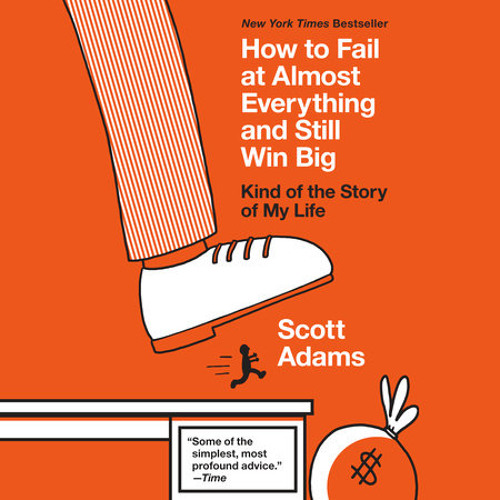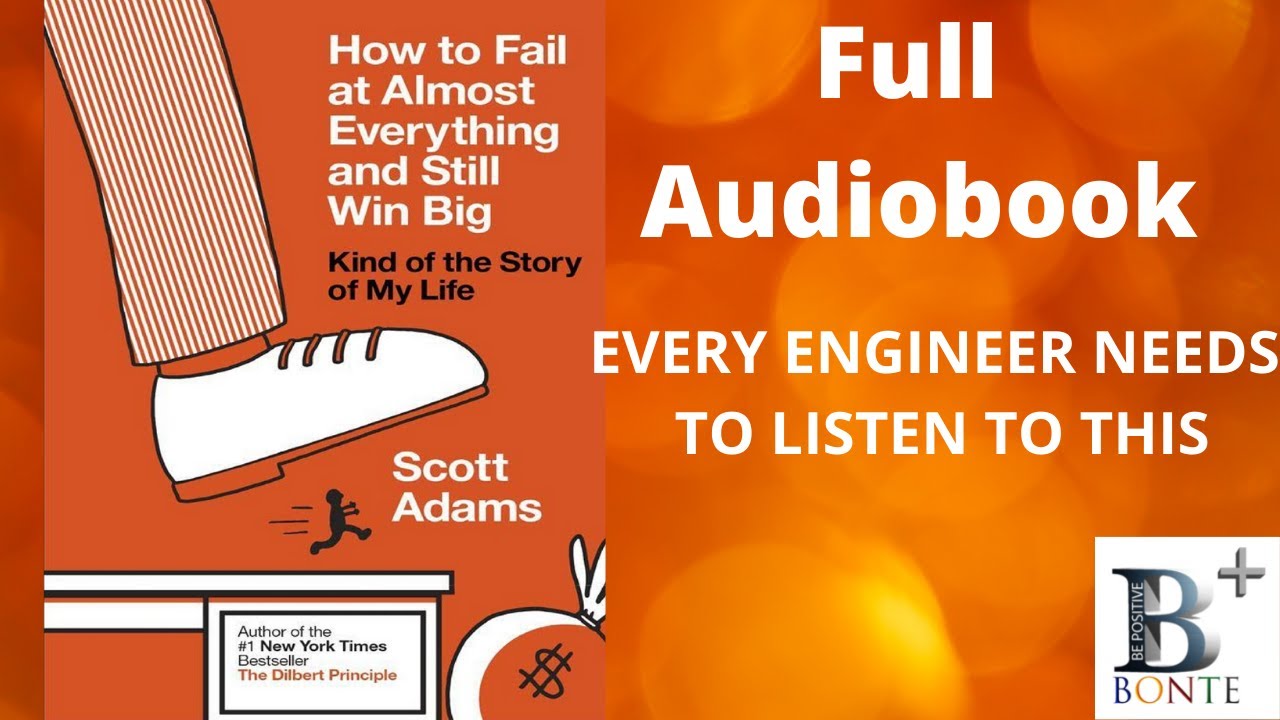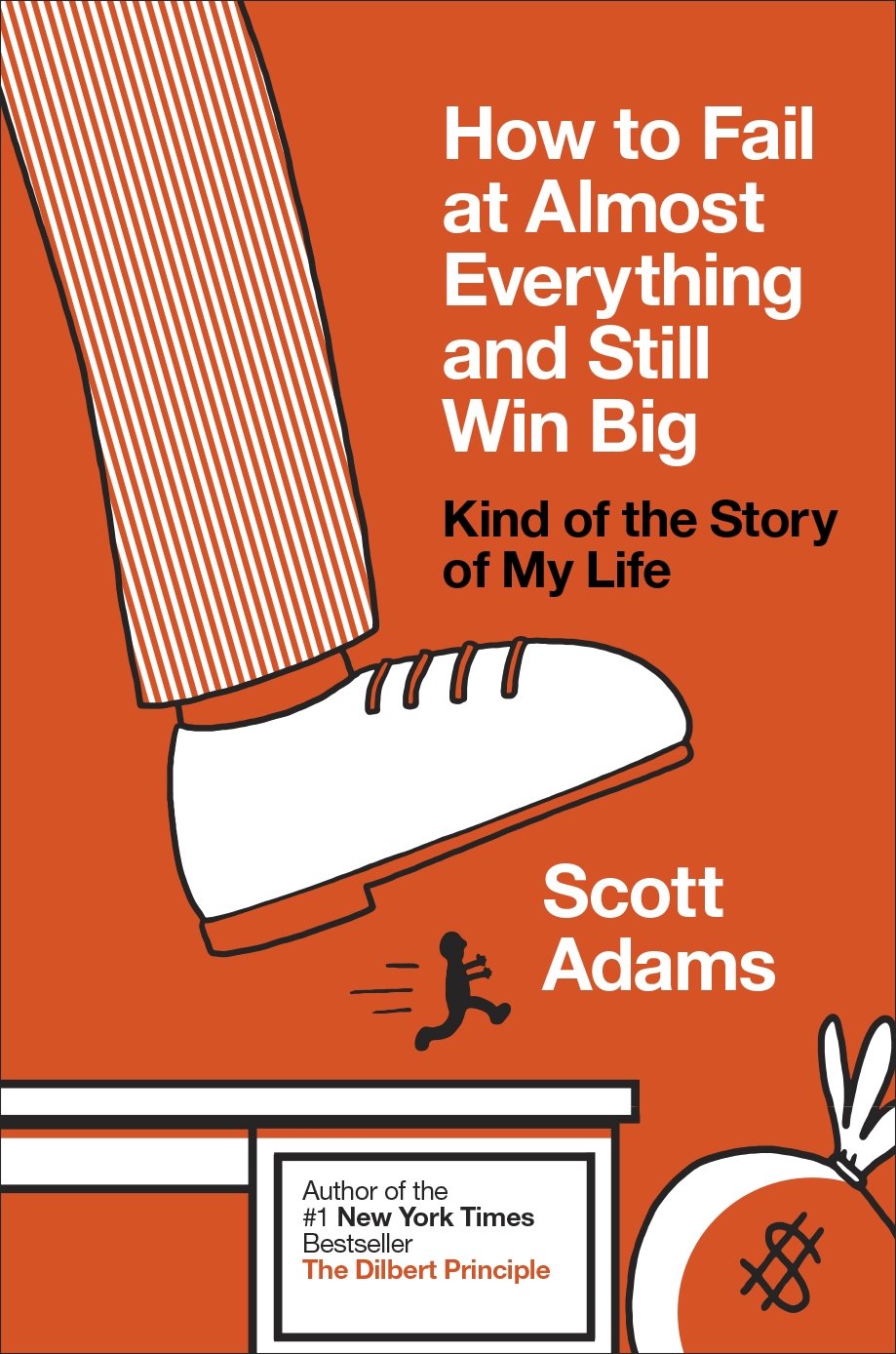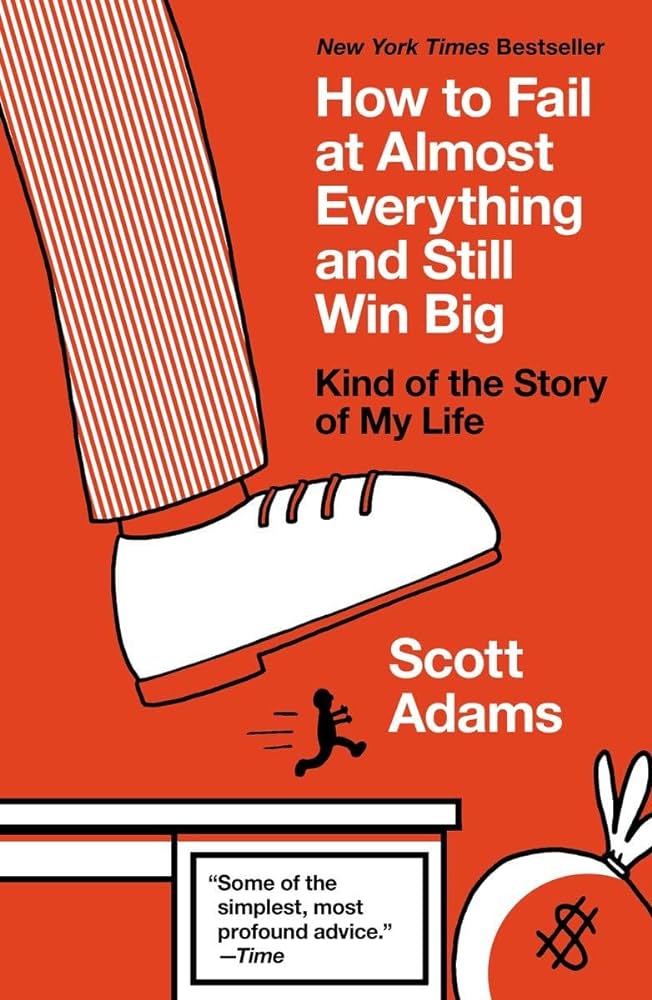Scott Adams’ audiobook, “How to Fail at Almost Everything And Still Win Big,” explores his unique approach to success through embracing failure. He shares practical advice and personal stories to inspire resilience and creativity.
Scott Adams, the creator of the famous “Dilbert” comic strip, reveals his unconventional path to success in this audiobook. He emphasizes the importance of embracing failure and learning from it. Adams argues that adopting a systems-based approach rather than setting specific goals can lead to greater achievements.
His insights are drawn from personal experiences, making his advice both relatable and actionable. This audiobook is perfect for anyone seeking inspiration and practical strategies to navigate the ups and downs of life while aiming for success.

Introduction To Scott Adams
Scott Adams is best known for creating the comic strip Dilbert. His book, How to Fail at Almost Everything And Still Win Big, is a popular audiobook. It offers insights into success, failure, and personal growth. Let’s dive into his journey before fame and the creation of Dilbert.
Career Before Fame
Before Scott Adams became famous, he had several jobs. He worked in banking and technology. Adams also faced many failures. He learned valuable lessons from each experience.
In his book, Adams shares stories from his early career. He talks about his struggles and what he learned. These lessons helped him later in life.
Dilbert’s Creation
Dilbert was born from Adams’ experiences in the corporate world. He saw the humor in office life. In 1989, he started drawing the comic strip.
Adams used his own workplace frustrations to inspire Dilbert. The comic became popular quickly. People related to the characters and situations.
Today, Dilbert is a worldwide phenomenon. It has been featured in newspapers, books, and online. Scott Adams’ unique perspective brought office humor to life.
| Job | Experience |
|---|---|
| Banking | Learned about finance |
| Technology | Faced corporate challenges |
- Failures taught Adams valuable lessons.
- Adams used workplace humor to create Dilbert.
- His book offers insights into success.
Concept Of Failing Forward
The idea of failing forward is central to Scott Adams’ book, “How to Fail at Almost Everything And Still Win Big.” This concept teaches that failure is not a dead-end but a stepping stone to success. Instead of fearing failure, embrace it as part of your journey. This mindset helps you grow, learn, and eventually achieve your goals.
Embracing Failure
Adams emphasizes the importance of embracing failure. He explains that failure is a natural part of life. Everyone fails at something at some point. Accepting this fact helps you handle setbacks better.
- Failure is a learning opportunity.
- Failure builds resilience.
- Failure helps you find better paths.
By accepting failure, you can stay motivated and focused. This mindset allows you to keep moving forward even when things don’t go as planned.
Learning From Mistakes
Adams highlights the value of learning from mistakes. Each failure carries a lesson. By analyzing what went wrong, you can avoid repeating the same mistakes. This process makes you wiser and more prepared for future challenges.
- Identify what went wrong.
- Analyze the factors contributing to the failure.
- Implement changes to avoid similar mistakes.
Learning from mistakes turns failures into valuable experiences. It helps you improve your strategies and decision-making skills.
In summary, the concept of failing forward encourages you to view failure positively. Embrace failure and learn from your mistakes to achieve long-term success.
Key Principles From The Audiobook
Scott Adams, the creator of Dilbert, offers a unique perspective on success. In his audiobook, “How to Fail at Almost Everything And Still Win Big,” Adams shares valuable lessons. These principles help navigate life’s challenges and turn failures into successes.
Goals Vs. Systems
Adams emphasizes the difference between goals and systems. Goals are specific targets you aim to achieve. Systems are the processes you follow every day.
| Goals | Systems |
|---|---|
| Lose 10 pounds | Exercise daily and eat healthy |
| Write a book | Write 500 words every day |
Adams suggests focusing on systems instead of goals. Systems create daily habits that lead to success. Goals can sometimes be discouraging if not achieved. Systems offer continuous improvement.
Skill Stacking
Adams introduces the concept of skill stacking. This means combining various skills to become more valuable. You don’t need to be an expert in one area. Instead, be good at several things.
- Learn public speaking
- Understand basic graphic design
- Get better at social media
Combining these skills makes you unique. For example, a good speaker with design skills stands out. Adams himself combines drawing, humor, and business knowledge. This mix made Dilbert a huge success.
Focus on building a stack of complementary skills. This increases your chances of success in many fields.
The Power Of Affirmations
Scott Adams’ audiobook, “How to Fail at Almost Everything And Still Win Big”, offers many insights. One of the most compelling is the power of affirmations. Adams believes that affirmations can help you achieve your goals. Let’s dive deeper into this concept.
Adams’ Personal Experiences
Scott Adams shares his personal experiences with affirmations in the audiobook. He used affirmations to achieve many of his goals. He even credits them for his success with the comic strip, Dilbert. Adams would write down his goals 15 times a day. He believes this practice helped him achieve his dreams.
Skepticism And Science
Many people are skeptical about affirmations. They think it’s just wishful thinking. But science shows that affirmations can work. Studies suggest that positive thinking can improve performance. The brain reacts to positive affirmations by reducing stress and improving focus. This makes it easier to achieve your goals.
Here’s a simple table summarizing the benefits of affirmations:
| Benefit | Explanation |
|---|---|
| Reduces Stress | Positive affirmations calm the mind. |
| Improves Focus | Affirmations help you concentrate on your goals. |
| Boosts Confidence | They make you believe in your abilities. |
Here are some tips for using affirmations:
- Write down your goals every day.
- Use positive language.
- Believe in what you write.
Energy Management
In Scott Adams’ audiobook, “How to Fail at Almost Everything And Still Win Big,” energy management is a key theme. Scott believes managing your energy is more crucial than managing your time. This approach can help you achieve more and feel better every day.
Diet And Fitness Tips
Scott Adams emphasizes the importance of diet and fitness in energy management. A balanced diet fuels your body and mind. Here are some of his top tips:
- Eat foods rich in protein and fiber.
- Avoid sugary snacks that cause energy crashes.
- Drink plenty of water to stay hydrated.
Fitness is equally important. Regular exercise boosts your energy levels. Scott suggests the following exercises:
- Go for a 30-minute walk daily.
- Try strength training twice a week.
- Incorporate stretching into your routine.
Mental Energy
Managing mental energy is also crucial. Scott shares valuable insights on this:
- Focus on tasks that excite you.
- Take regular breaks to avoid burnout.
- Practice mindfulness to stay centered.
Scott also talks about the power of positive affirmations. They help you stay motivated and focused. Here are some examples:
- “I am capable of achieving great things.”
- “I have the energy to succeed.”
- “I am focused and determined.”
These simple practices can help you manage your energy effectively.

Deciding Vs. Wanting
In Scott Adams’ audiobook, How to Fail at Almost Everything And Still Win Big, the concept of Deciding vs. Wanting takes center stage. The distinction between these two actions can shape your path to success. Wanting something is passive, while deciding to achieve it is an active commitment. This mindset shift can transform your approach to goals and tasks.
The Psychology Of Action
Understanding the psychology of action is crucial. Wanting is driven by desires and dreams. Deciding, on the other hand, involves planning and execution. It requires a firm commitment and a clear plan. This difference can be the key to overcoming obstacles.
Deciding creates a mental shift. It turns abstract goals into actionable steps. This process motivates you to take consistent action. It’s the difference between wishing and achieving.
Overcoming Procrastination
Procrastination is a common barrier. It often stems from a lack of clear decisions. By deciding, you create urgency and purpose. This helps in tackling tasks head-on.
Here are some tips to overcome procrastination:
- Set clear goals: Break them into smaller tasks.
- Prioritize tasks: Focus on the most important ones first.
- Eliminate distractions: Create a focused work environment.
- Use a timer: Work in short, focused bursts.
Deciding to act on these tips can make a significant difference. It can lead to better productivity and success.
Talent Vs. Practice
Scott Adams’ audiobook, ‘How to Fail at Almost Everything And Still Win Big’, delves into the debate of talent versus practice. This topic is crucial for anyone chasing success. Adams shares valuable insights, breaking down common misconceptions.
Myths Of Inborn Talent
Many believe talent is inborn. They think you are either talented or not. Adams challenges this idea. He argues that talent alone rarely leads to success.
- Myth: Only talented people succeed.
- Reality: Effort and practice matter more.
- Myth: Talent guarantees success.
- Reality: Without practice, talent fades.
Adams emphasizes that hard work often beats talent. Many successful people were not initially talented. They achieved greatness through persistent effort.
The Role Of Diligent Practice
Practice is the key to mastering any skill. Adams highlights that consistent practice builds proficiency. He believes that anyone can improve with effort.
- Identify your goals.
- Set a practice routine.
- Focus on small, daily improvements.
- Track your progress.
Adams suggests using systems over goals. A system is a daily habit that leads to long-term success. For example, writing every day improves your skills over time.
He also talks about the importance of energy management. Practicing when you are most energetic yields better results. This strategy helps you stay consistent and avoid burnout.
Simplifying Your Life
Scott Adams’ audiobook, How to Fail at Almost Everything And Still Win Big, provides practical tips for simplifying your life. Simplifying your life can lead to greater success and happiness. This section will explore how to focus better and declutter your environment.
The Importance Of Focus
Focus is the key to achieving your goals. Scott Adams emphasizes the importance of focusing on one task at a time. Multitasking can reduce your productivity and increase stress levels. By focusing on a single task, you can complete it more efficiently.
- Set clear goals: Knowing what you want to achieve helps you stay focused.
- Eliminate distractions: Turn off notifications and find a quiet workspace.
- Take breaks: Short breaks can help you maintain your focus over time.
Decluttering Your Environment
A cluttered environment can lead to a cluttered mind. Scott Adams suggests decluttering your space to improve productivity and reduce stress.
Here are some simple steps to declutter your environment:
- Start small: Begin with one area, like your desk or a drawer.
- Sort items: Divide items into categories: keep, donate, and discard.
- Organize: Use storage solutions to keep items neatly arranged.
- Maintain: Regularly clean and organize your space to prevent clutter from returning.
A clean and organized environment can boost your mood and productivity. It also makes it easier to find what you need when you need it.
Finding Happiness In Your Work
Scott Adams’ audiobook “How to Fail at Almost Everything And Still Win Big” offers valuable insights on finding joy in your job. He shares strategies to transform your work life into a source of happiness. This section focuses on creating job satisfaction and a fulfilling career path.
Job Satisfaction Factors
Understanding what makes your job enjoyable is crucial. Job satisfaction isn’t just about the paycheck. It includes various factors, such as:
- Work-life balance
- Positive work environment
- Growth opportunities
- Recognition and rewards
- Autonomy
A positive work environment fosters creativity and reduces stress. Growth opportunities help you advance and stay motivated. Recognition and rewards make you feel valued. Autonomy allows you to manage your tasks efficiently.
Creating A Fulfilling Career Path
Building a career path that brings joy involves planning and self-awareness. Scott Adams emphasizes the importance of setting systems over goals. Systems create habits that lead to success.
Consider these steps to create a fulfilling career path:
- Identify your passions
- Develop relevant skills
- Set achievable systems
- Seek feedback
- Adjust your path as needed
Identifying your passions helps you find work you love. Developing relevant skills makes you competent in your field. Setting achievable systems ensures steady progress. Seeking feedback helps you improve continuously. Adjusting your path ensures you stay aligned with your goals.
Scott Adams’ audiobook provides a detailed guide to finding joy in your work. Implementing his strategies can lead to a more satisfying and fulfilling career.
Adams’ Approach To Risk
Scott Adams’ audiobook, How to Fail at Almost Everything and Still Win Big, is a treasure trove of wisdom about risk-taking. Adams’ approach to risk is both practical and insightful. He emphasizes the importance of calculated risks and coping with uncertainty.
Calculated Risk-taking
Adams believes in taking calculated risks. He advises evaluating potential rewards against possible losses. This method helps in making informed decisions. Adams suggests not betting everything on one outcome. Diversify your efforts to spread the risk.
- Evaluate potential rewards
- Assess possible losses
- Diversify your efforts
Adams shares personal stories of his own failures and successes. These stories illustrate the value of calculated risks. His approach encourages learning from each failure. This way, each step is a move towards eventual success.
Coping With Uncertainty
Adams emphasizes the need to embrace uncertainty. He encourages building skills that are versatile. Skills like public speaking, writing, and persuasion are invaluable. These skills are beneficial in various scenarios.
Adams also talks about the importance of maintaining good health. A healthy body supports a resilient mind. This helps in facing uncertainties with confidence. He suggests regular exercise and a balanced diet.
| Skills to Develop | Benefits |
|---|---|
| Public Speaking | Boosts confidence |
| Writing | Enhances communication |
| Persuasion | Improves influence |
By focusing on these areas, Adams offers a roadmap. A roadmap for navigating the unpredictable nature of life.
The Audiobook’s Impact
Scott Adams’ audiobook, How to Fail at Almost Everything And Still Win Big, has made waves. It has transformed the lives of many listeners. Its practical advice and humor resonate deeply.
Influencing Entrepreneurs
This audiobook has a profound effect on entrepreneurs. Many aspiring business owners find it inspirational. They appreciate the candid stories of Adams’ failures and successes. The book emphasizes the importance of perseverance.
Adams argues for a systems approach over goals. This idea reshapes how many entrepreneurs plan their ventures. The audiobook encourages risk-taking and learning from failures. It provides a fresh perspective on achieving success.
Entrepreneurs appreciate the practical tips in the audiobook. They find the advice on energy management particularly useful. This focus on personal well-being helps them sustain long-term efforts.
Cultural Reception
The cultural reception of the audiobook is overwhelmingly positive. Listeners praise its honesty and humor. Many relate to Adams’ experiences and find solace in his words.
The audiobook has sparked discussions in various communities. It encourages people to share their own stories of failure and success. This sharing fosters a sense of camaraderie and support.
Critics also commend the audiobook for its practical advice. They appreciate its unique approach to self-help. The blend of humor and wisdom makes it accessible to a wide audience.
Overall, the audiobook leaves a lasting impact on its listeners. It inspires them to embrace failure and keep striving for success.

Conclusion
Scott Adams’ audiobook offers valuable insights on turning failures into successes. It teaches resilience, strategy, and personal growth. Embrace the lessons to navigate life’s challenges. This audiobook is a must-listen for anyone seeking inspiration and practical advice. Transform your mindset and achieve your goals with Scott Adams’ proven methods.



